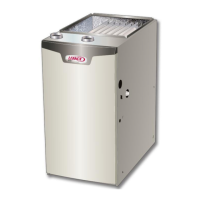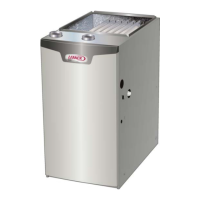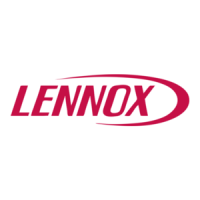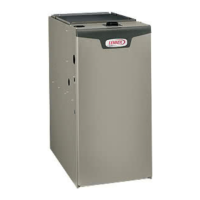Page 75
2 - On eld supplied terminations for side wall exit,
exhaust piping may extend a maximum of 12 inches
(305MM) for 2” PVC and 20 inches (508MM) for 3”
(76MM) PVC beyond the outside wall.
3 - If exhaust piping must be run up a side wall to position
above snow accumulation or other obstructions,
piping must be supported every 24 inches (610MM).
When exhaust piping must be run up an outside
wall, any reduction in exhaust pipe size must be
done after the nal elbow.
4 - Distance between exhaust pipe terminations on
multiple furnaces must meet local codes.
NON-DIRECT VENT ROOF TERMINATION KIT
(15F75 or 44J41)
UNCONDITIONED
ATTIC SPACE
3” (76mm) OR
2” (51mm) PVC
PROVIDE SUPPORT
FOR EXHAUST LINES
12” (305mm)
ABOVE AVE.
SNOW
ACCUMULATION
FIGURE 41
NOTE - Do
tical discharge through an existing unused chimney or stack is required, insert piping
inside
trated. In any exterior portion of chimney, the exhaust vent must be insulated.
STRAIGHT-CUT OR
ANGLE-CUT IN DIRECTION
OF ROOF SLOPE
SHOULDER OF FITTINGS
PROVIDE SUPPORT
OF PIPE ON TOP PLATE
EXTERIOR
PORTION OF
CHIMNEY
INSULATE
TO FORM
SEAL
SHEET
METAL TOP
PLATE
NON-DIRECT VENT APPLICATION
USING EXISTING CHIMNEY
Minimum 12” (305MM)
above chimney top
plate or average snow
accumulation
FIGURE 42
Condensate Piping
This unit is designed for either right- or left-side exit of
condensate piping in upow applications. In horizontal
applications, the condensate trap must extend below the
unit. An 8” service clearance is required for the conden-
sate trap. Refer to FIGURE 43 for condensate trap loca-
tions. FIGURE 51 (3/4” drain connection) and FIGURE 52
(1/2” drain connection) shows trap assembly using 1/2”
PVC or 3/4” PVC.
NOTE - If necessary the condensate trap may be installed
up to 5’ away from the furnace. Use PVC pipe to connect
trap to furnace condensate outlet. Piping from furnace
must slope down a minimum of 1/4” per ft. toward trap.
1 - Determine which side condensate piping will exit
the unit, location of trap, eld-provided ttings and
length of PVC pipe required to reach available
drain.
2 - For furnaces with a 1/2” drain connection use a 3/8
allen wrench and remove plug (gure 43) from the
cold end header box at the appropriate location on
the side of the unit. Install eld-provided 1/2 NPT
male tting into cold end header box. For furnaces
with a 3/4” drain connection use a large at head
screw driver or a 1/2” drive socket extension and
remove plug. Install provided 3/4 NPT street elbow
tting into cold end header box. Use Teon tape or
appropriate pipe dope.
3 - Install the cap over the clean out opening at the base
of the trap. Secure with clamp. See FIGURE 51 or
FIGURE 52.
4 - Install drain trap using appropriate PVC ttings, glue
all joints. Glue the provided drain trap as shown in
FIGURE 51 or FIGURE 52. Route the condensate
line to an open drain. Condensate line must
maintain a 1/4” downward slope from the furnace to
the drain.
CONDENSATE TRAP AND PLUG LOCATIONS
(Unit shown in upflow position)
NOTE - In upflow applications where side return
sate trap, filter rack must be installed beyond
condensate trap or trap must be re-located to
Trap
(same on
right side)
Plug
(same on left side)
1-1/2 in.
Rubber
Grommet
FIGURE 43
5 - FIGURE 46 and FIGURE 48 show the furnace and
evaporator coil using a separate drain. If necessary
the condensate line from the furnace and evaporator
coil can drain together. See FIGURE 47, FIGURE
49 and FIGURE 50. Upow furnace (FIGURE 49)
- In upow furnace applications the eld provided
vent must be a minimum 1” to a maximum 2” length
above the condensate drain outlet connection.
Any length above 2” may result in a ooded heat
exchanger if the combined primary drain line were
to become restricted.
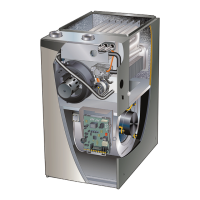
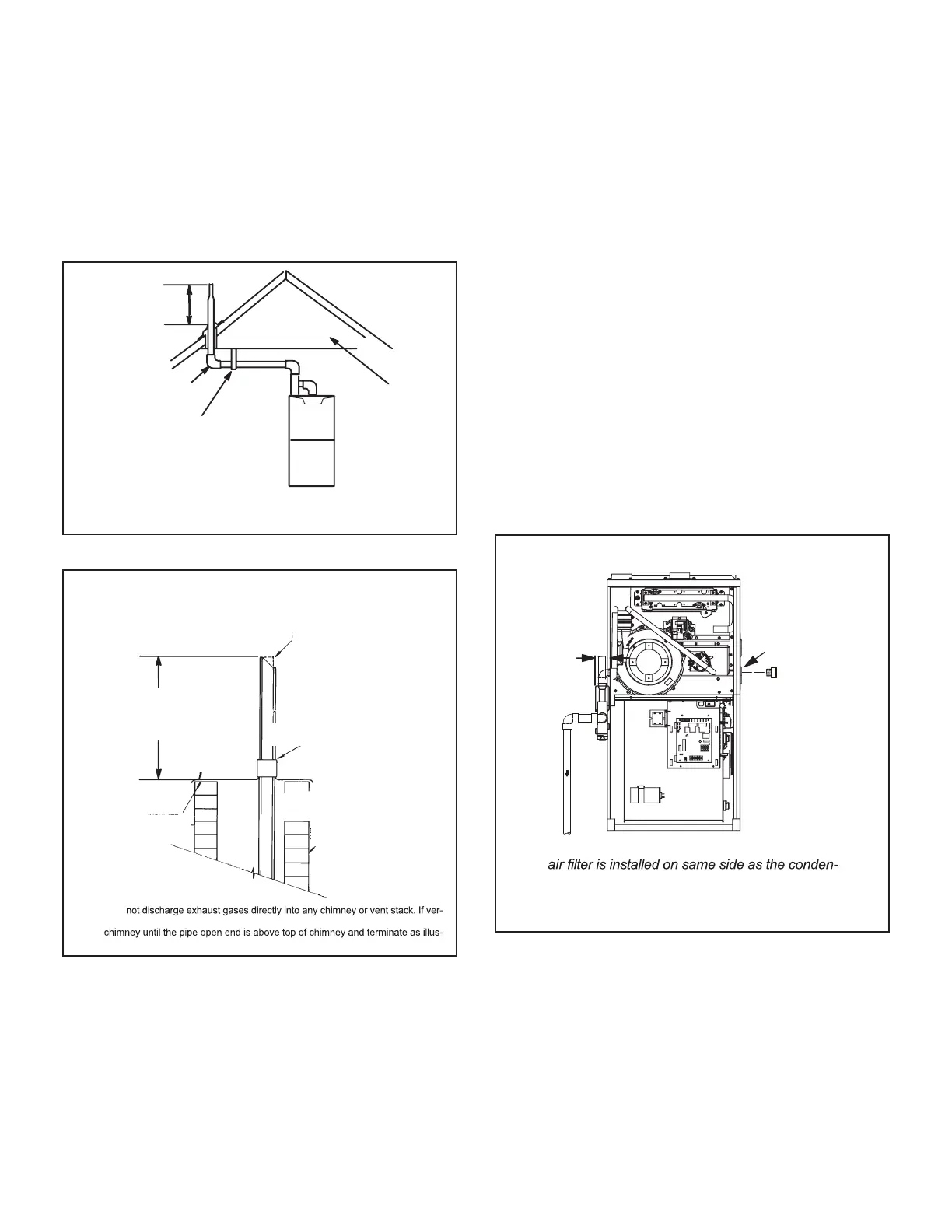